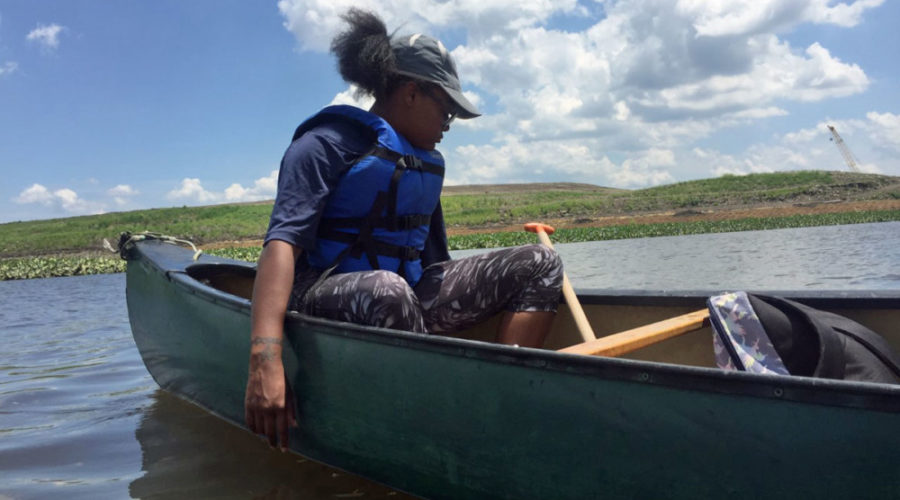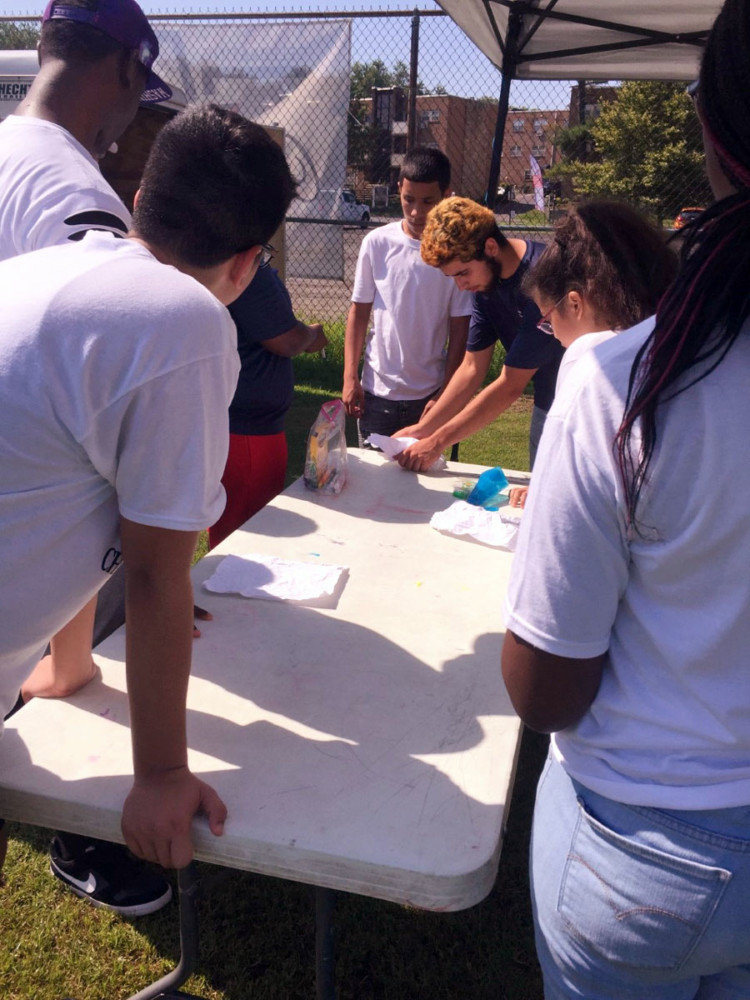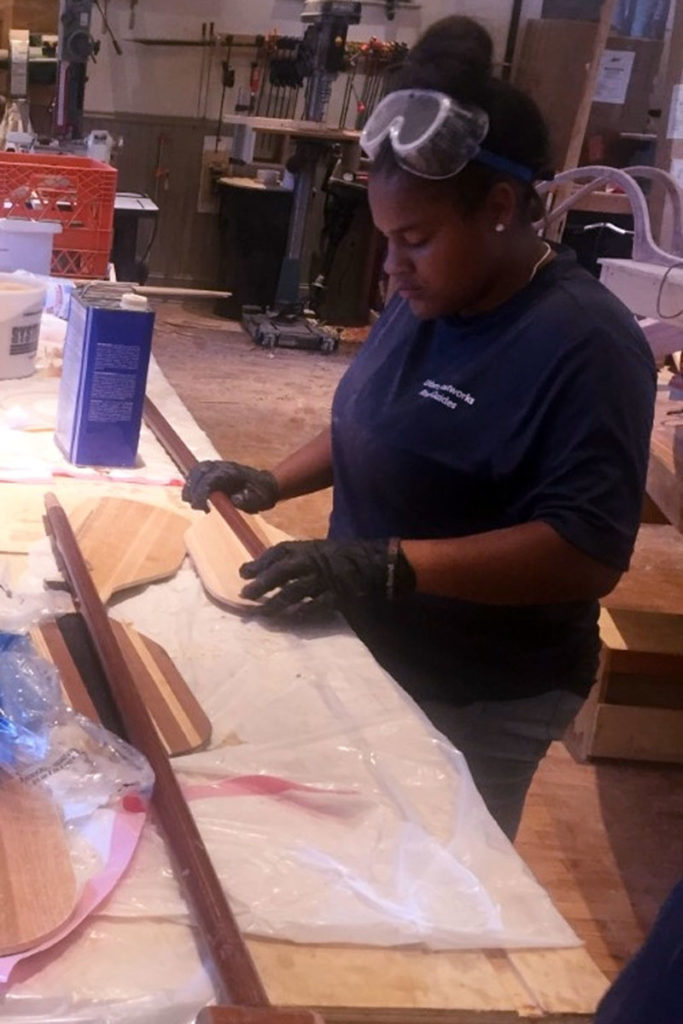
Three Camden high schoolers share their experiences caring for and exploring the Cooper River–and the impact it’s had on their lives.
Samyiah Williams, 17, admits that when she applied to be a student employee through UrbanPromise Ministries’ Office of Experiential Learning, she wasn’t exactly motivated by a love of nature.
“I only did it for the money,” she said. “But then after a while, I actually really started liking it, doing the water testing and stuff.”
Water quality tests of the Cooper River, a tributary of the Delaware River that runs through Camden, is just one of many tasks performed by Williams and her classmates Nate Hernandez, 17, and Hope Lugo, 18. This year, the three of them make up the second cohort of student employees to work for UrbanPromise during the school year.
Their newly-added positions expand on UrbanPromise’s RiverGuides program, which employs students over the summer to lead free community paddle tours of the Cooper River. Hernandez, Williams, and Lugo serve as RiverGuides in the warmer months, while also helping build wooden paddle boats, canoes and kayaks as part of the BoatWorks program. They also assist with lesson and trip planning for the environmental after-school StreamStewards program.

UrbanPromise is a nonprofit that supports and advances Camden’s youth. In addition to a variety of programs, it runs UrbanPromise Academy, a private high school just outside the city. Lugo, Hernandez and Williams attend UrbanPromise Academy.
Rachel Abbott is the Environmental Education Program Director for UrbanPromise Academy. She says that fostering an awareness of and passion for nature in urban youth is a crucial part of UrbanPromise’s mission.
“Having a connection to what’s around you is really important,” Abbott said. “For understanding how the world works and how we can be stewards of the place that we live and enjoy, but also so we can protect each other.”
Working closely with the river has certainly had an impact on Hernandez, Williams, and Lugo. All three grew up in Camden, though Hernandez was born in Philly. Within their urban environment, they’ve rarely had opportunities to interact with nature. Exploring the river has unlocked a world in their backyards that’s entirely new to them.
“I didn’t know any of that was there until you go through the riverway to see the things that are behind the trees that most people don’t see on a daily basis,” Lugo said.
As such, the students have learned about historical landmarks along the river, like the Campbell’s Soup headquarters, Gateway Park, and the Federal Street Bridge. And, to their excitement, they’ve seen plenty of wildlife. Hernandez says he’s spotted eagles and deer, and Williams recalls seeing a turtle. Lugo, meanwhile, caught sight of several double-crested cormorants, which are common to the area.
“It’s underwater and you see its head pop out,” she said. “That’s the first time I’ve ever seen a bird like that.”
The students say the experience has given them a whole new appreciation for their environment. Lugo, who has been a RiverGuide for three years, says that her time understanding the threats that face the river, especially pollution from plastic and other trash, has made her rethink how she interacts with her environment.
“I used to litter a lot,” Lugo admitted. “But I don’t do it as much now.”
Williams agrees and tries to spread her newfound environmental awareness to others in her life.
“Sometimes just to be acting like I’m smart, I’ll spit out some facts to my mom, my grandma and my sister,” Williams said. “Like, ‘Bet you didn’t know that, huh?’”

Ongoing Challenges Despite Progress
For UrbanPromise’s environmental educators, fostering that kind of passion is no small feat. Abbott says it can often be challenging to push young people toward action, especially in a city as economically distressed as Camden. In her experience, environmental issues feel much less immediate to students than the ones they confront in their personal lives.
“I think that there are really just a lot of pressing issues here that people don’t see as related,” Abbott said. “And those are definitely what are on our students’ minds, mostly. Like, what is going on at home? Who’s raising me and do they have a job? How much money are we bringing in?”
Educating about the climate crisis, Abbott says, is even more challenging. It seems abstract compared to the environmental issues students observe day-to-day, like abandoned and contaminated brownfield sites. But Abbott and other educators try to integrate the topic into their lessons and point to how it’s already affecting students’ lives, whether they realize it or not.
“We were supposed to have a paddle trip with the Stream Stewards and I’m gonna have to cancel because it’s getting really cold all of a sudden,” Abbott said. “We’re having conversations about how the weather’s more variable. We talk a lot about the fact that the river is actually rising. I think it’s just a continuous lesson.”
Lugo is proof that it’s working. When asked why it’s important to learn about the environment, “global warming” was her immediate response. Hernandez and Williams agree that the climate crisis is often in the back of their minds, but they often feel powerless to act.
Still, all three say they’re determined to hold on to their concern for the planet even after they graduate from UrbanPromise. Lugo, for example, wants to keep building boats and other things out of reclaimed wood, in order to give old materials new life.
“Working with wood is recycling,” she said. “I don’t like killing trees. For the most part, it will be dead trees. I want to make them useful instead of just leaving them around.”
Photos: UrbanPromise
This story was produced in collaboration with the New Jersey Sustainability Reporting Hub project. It was originally reported by Brianna Baker for Green Philly, and may be re-distributed through the Creative Commons License, with attribution.
